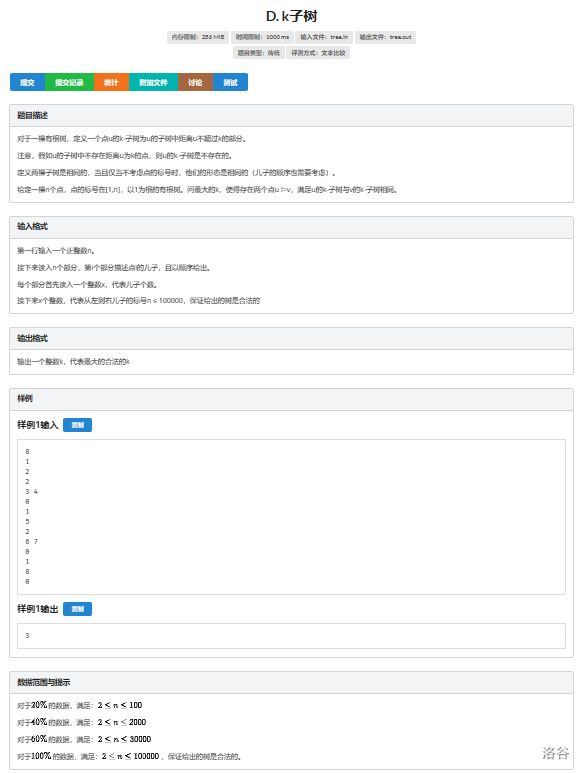学习笔记——树上哈希
普通子树哈希
树上的很多东西都是转化成链上问题的,比如树上哈希
树上哈希,主要是用于树的同构这个东西上的
什么是树的同构?
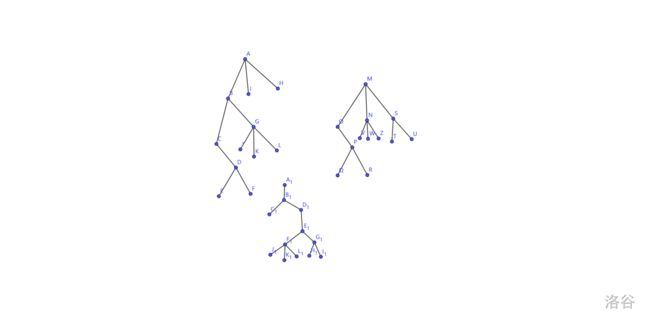
如图,不考虑节点编号,三棵树是同构的
将树转化成链,一般有两种方式:环游欧拉序与欧拉序
为了尽可能减少哈希冲突,进制位越小越好
又因为不考虑节点编号,很明显,若是采用欧拉序的话,得要记录该节点孩子数
环游欧拉序只用进入打上1,出来打上2即可搞定
小tips:欧拉序相较于环游欧拉序可能更快,请量力而行
于是,就可以采用普通的哈希方式啦!
指定范围子树哈希
如果说是将子树横着割一刀呢?
如图,是一棵树
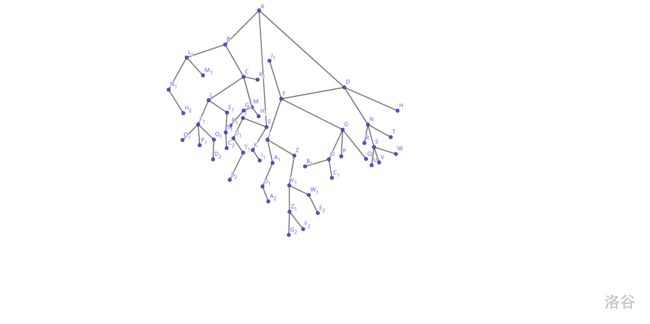
放心,就60个节点
我们考虑D节点的子树中,距离D不超过3的所有点
如图
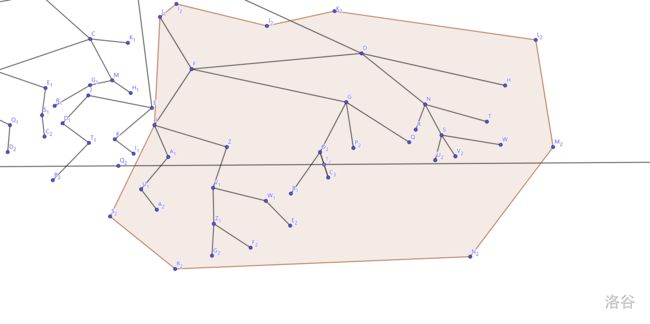
接着是环游欧拉序(考虑在某些原因的份上,我只保留D的子树)
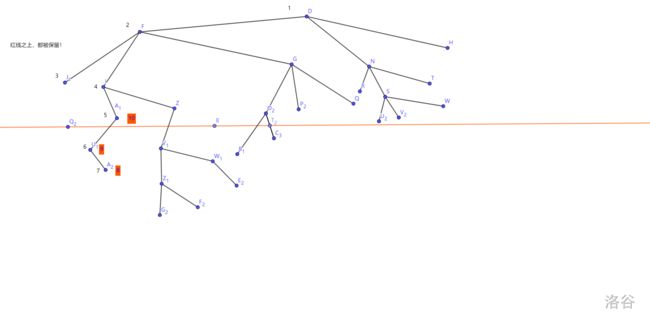
为什么我只写到10?因为作者实在太懒因为到10就够了
对于范围树上哈希,我们有两种方式——拼接与删除
因为哈希一般在取模的意义下,所以,删除是非常难以做到的~~(作者亲测过)~~
那只剩下拼接了,这个就和链上拼接一模一样了(也很像是前缀和)
模板题
如果说看懂了前面的,这题就不难了。首先可以二分。因为若是 k k k是答案,那么一定存在两个节点的 k k k层子树是同构的。在其中任选两个对应的点,所组成的子树的子树一定是同构的
这么说显得很烦,翻译成人化就是:对于每个符合题目要求的 k k k层的两个子树(就是这两个字叔同构),他们的所有子树中一定有同构的,并且层数有 0 0 0、有 1 1 1、有 ⋯ \cdots ⋯、有 k − 1 k-1 k−1
于是,题目就这样转化成了求是否存在同构的 k k k层子树
我们可以对于每个节点,求出它的 k k k层祖先,代表这个节点绝对存在 k k k层子树;
再找出 k + 1 k+1 k+1曾祖先,代表这个节点的子树将要在他的祖先的子树中被删去(不被添加)
最后用一个map(建议使用gp_hash_table)统计答案
题目就这么结束了
代码
#pragma GCC optimize(1, "inline", "Ofast")
#pragma GCC optimize(2, "inline", "Ofast")
#pragma GCC optimize(3, "inline", "Ofast")
#include
vt[tl].push_back(pii(l[i], i));
}
for (int i = 1; i <= n; i++) sort(vt[i].begin(), vt[i].end());
bool flg = 0;
for (int i = 1; i <= n; i++) {
if (!ytl[i])
continue;
int lr = l[i];
for (auto j : vt[i]) {
int k = j.second;
// cout<
(nx[i] *= getpw(l[k] - lr));
(nx[i] += x[l[k] - 1] - (x[lr - 1] * getpw(l[k] - lr)));
// cout<
lr = r[k] + 1;
}
(nx[i] *= getpw(r[i] - lr + 1));
(nx[i] += x[r[i]] - (x[lr - 1] * getpw(r[i] - lr + 1)));
if (cun[nx[i]])
return 1;
// cout<
cun[nx[i]] = 1;
// cout<
// puts("");
}
return flg;
}
main() {
freopen("tree.in", "r", stdin);
freopen("tree.out", "w", stdout);
ll[0] = 1;
for (int i = 1; i < N; i++) ll[i] = (ll[i - 1] * K);
IO::pin >> n;
for (int i = 1, x, y; i <= n; i++) {
IO::pin >> x;
while (x--) IO::pin >> y, addE(i, y);
}
getx();
for (int j = 1; j <= T; j++)
for (int i = 1; i <= n; i++) fa[i][j] = fa[fa[i][j - 1]][j - 1];
int l = 0, r = n - 1;
while (l < r) {
int mid = l + r + 1 >> 1;
// cout<
if (chk(mid))
l = mid;
else
r = mid - 1;
}
printf("%llu\n", l);
}
